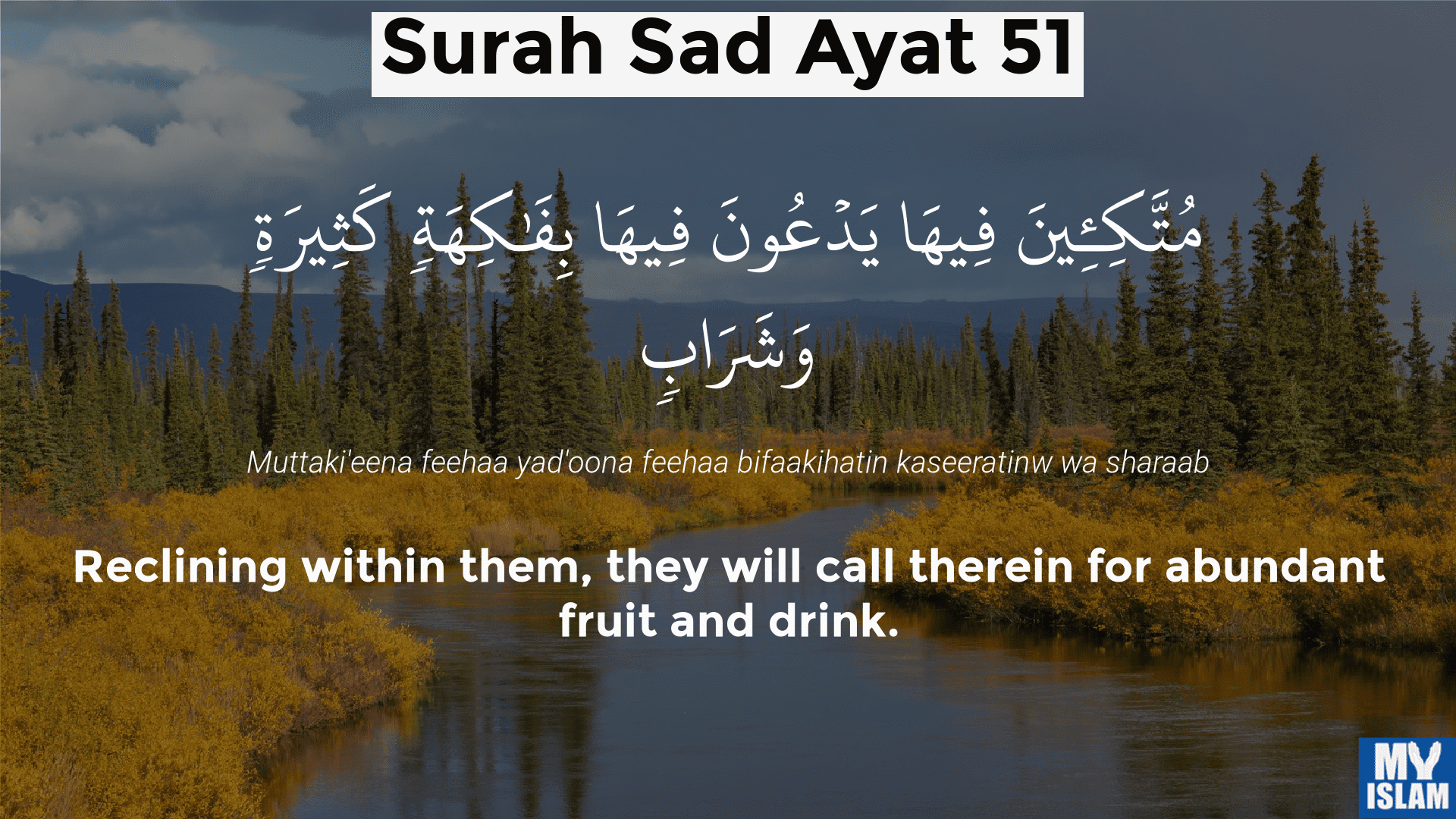Surah Sad Ayat 49 in Arabic Text
English Translation
Here you can read various translations of verse 49
This is a reminder. And indeed, for the righteous is a good place of return
This is a Message (of admonition): and verily, for the righteous, is a beautiful Place of (Final) Return,-
This was a remembrance. An excellent retreat awaits the God-fearing
This is a Reminder, and verily, for the Muttaqun (pious and righteous persons – see V. 2:2) is a good final return (Paradise),
This is a reminder. And lo! for those who ward off (evil) is a happy journey’s end,
This is a Remembrance; and surely for the pious is indeed a fair resorting.
This is a lesson. The devout will have a good place to return to:
یہ نصیحت ہے اور یقین مانو کہ پرہیزگاروں کی بڑی اچھی جگہ ہے
Quran 38 Verse 49 Explanation
For those looking for commentary to help with the understanding of Surah Sad ayat 49, we’ve provided two Tafseer works below. The first is the tafseer of Abul Ala Maududi, the second is of Ibn Kathir.
Ala-Maududi
(38:49) This was a remembrance. An excellent retreat awaits the God-fearing
50. The Prophet AlYasa (peace be upon him) has been mentioned only twice in the Quran, in Surah Al-Anaam, Ayat 86 and here, without any detail about him. Only his name appears in the chain of the Prophets. He was one of the major Prophets of Israel, belonged to Abel Meholah, a place on the river Jordan, and is well known as Elisha among the Jews and Christians. When the Prophet Elijah (peace be upon him) had taken refuge in the Sinai peninsula, he was commanded to return to Syria and Palestine for some important works, one of which was to prepare the Prophet Elisha for his successor-ship. Accordingly, when the Prophet Elijah came to his town, he found Elisha ploughing with twelve yoke of oxen before him, and he with the twelfth. The Prophet Elijah passed by him and cast his mantle upon him, and he left the oxen and followed him. (I Kings, 19:15-21). He remained under training with him for 10 to 12 years. Then, when Allah recalled Elijah, he was appointed Prophet in his place. (2 Kings, oh.2). The Second Book of the Kings gives a detailed account of the Prophet Elisha (chs, 2 to 13), which shows that when the Israeli state of northern Palestine got lost in polytheism, idol-worship and moral evils, Elisha a pointed Jehu, the son of Jehoshaphat, the son of Nimshi, king of Israel against the royal dynasty due to whose misdeeds those evils had spread in Israel. Jehu not only put an end to Baal-worship, but also condemned to death every member of the wicked family, including its children. But in spite of this reformist revolution the evils that had taken root in Israel could not be completely eradicated, and after the death of the Prophet Elisha they assumed enormous proportions; so much so that the Assyrians began to invade Samaria whenever they pleased. For details, see (Surah Bani-Israil, ayat 5) note 7 and (Surah As-Saaffat, ayat 123-125) note 70,71.
51. Dhul-Kifil also has been mentioned only twice in the Quran, in (Surah Al-Anbiya, Ayat 85) and here. For our research about him see (Surah Al-Anbiya, ayat 85) note 81.
Ibn-Kathir
49. And verily, for those who have Taqwa is a good final return. 50. `Adn Paradise, whose doors will be opened for them. 51. Therein they will recline; therein they will call for fruits in abundance and drinks; 52. And beside them will be Qasirat-at-Tarf, (and) of equal ages. 53. This it is what you are promised for the Day of Reckoning! 54. (It will be said to them)! Verily, this is Our provision which will never finish.
Allah tells us that His blessed, believing servants will have a good final return in the Hereafter, which means their ultimate destination. Then He explains it further, as He says:
(`Adn Gardens) meaning, eternal gardens (of Paradise),
(whose doors will be opened for them.) means, when they come to them (these gardens), their gates will open for them.
(Therein they will recline;) It was said that this means that they will sit cross-legged on chairs beneath canopies.
(therein they will call for fruits in abundance) means, whatever they ask for, they will find it, and it will be prepared just as they wanted it.
(and drinks;) means, whatever kind of drink they want, the servants will bring it to them,
(With cups, and jugs, and a glass of flowing wine.) (56: 18).
(And beside them will be Qasirat-at-Tarf (chaste females)) means, they restrain their glances from anyone except their husbands, and do not turn to anyone else.
((and) of equal ages.) means, they will all be of the same age. This is the understanding of Ibn `Abbas, may Allah be pleased with him, Mujahid, Sa`id bin Jubayr, Muhammad bin Ka`b and As-Suddi.
(This it is what you are promised for the Day of Reckoning!) means, `this that We have mentioned of the features of Paradise is what He has prepared for His pious servants who will reach it after they have been resurrected from their graves and been saved from the Fire.’ Then Allah tells us that Paradise will never come to an end or disappear or cease to be. He says:
(Verily, this is Our provision which will never finish.) This is like the Ayat:
(Whatever is with you, will be exhausted, and whatever is with Allah will remain) (16:96).
(a gift without an end.) (11:108)
(for them is a reward that will never come to an end.) (84:25).
(its provision is eternal and so is its shade; this is the end of those who have Taqwa, and the end (final destination) of the disbelievers is Fire.)(13:35). And there are many similar Ayat.
Quick navigation links






